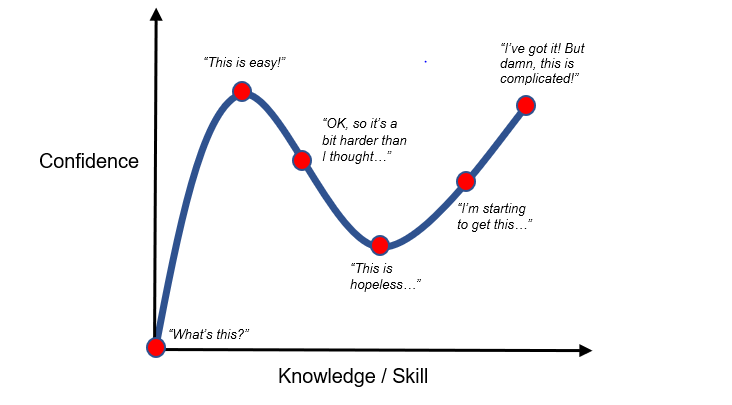Imposter Syndrome
2023-06-05
Author’s note: I’m going to experiment with shorter posts to help me get content out more regularly. Perfect is the enemy of done.
Do I really belong here?
I think most people who are reading this know what Imposter Syndrome is, but for the sake of completeness, here’s the definition from wikipedia:
A psychological occurrence in which people doubt their skills, talents, or accomplishments and have a persistent internalized fear of being exposed as frauds.
I experience this every time I start a new tech job. My new coworkers seem to know more than me and are better at communicating complex concepts. I always feel like I somehow “snuck in the door” and that I didn’t belong in the same room as these smart people.
Domain-specific jargon
I suspect that this feeling is more common in the tech industry due to two converging factors: technical jargon and domain-specific knowledge. No matter how well you know your software stack, each company puts their own spin on it. There is usually some internal lingo that you will need time to pick up and a custom library (or two) that you will need to learn.
Once you’ve picked up those skills, check in with yourself. Do you still feel out of place? If so, that’s okay (but I’m willing to bet you feel better than when you started).
Impostor syndrome can be good
Anxiety is no fun and it can very easily get in the way of career progression, but you can also use it to your advantage. That anxiety can propel you to learn more and sharpen your skills.
In our industry, becoming complacent can hold you back. As a contrast to imposter syndrome, see the Dunning-Kruger effect:
A cognitive bias whereby people with low ability, expertise, or experience regarding a type of task or area of knowledge tend to overestimate their ability or knowledge.

Author’s note: Dunning-Kruger is often a meme: those who write about it usually don’t understand it well enough.